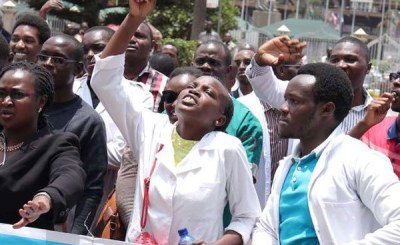Doctors across Kenya’s public hospitals have commenced a nationwide strike, leaving patients unattended or denied admission to medical facilities.

Kenya’s public hospital doctors initiated a nationwide strike on Thursday, alleging the government’s failure to fulfill promises made in a 2017 collective bargaining agreement following a 100-day strike that resulted in fatalities due to inadequate care.
The Kenya Medical Practitioners Pharmacists and Dentists Union (KMPDU) launched the strike demanding comprehensive medical insurance for doctors and the immediate deployment of 1,200 medical interns, as stipulated in the agreement.
Despite a court order urging dialogue with the government, approximately 4,000 doctors participated in the strike, defying the court’s directive, similar to the government’s disregard for three court orders mandating pay increases and the reinstatement of suspended doctors, according to Dr. Davji Bhimji, KMPDU’s secretary-general, and Dr. Dennis Miskellah, the union’s deputy secretary-general.
The absence of medical interns, constituting 27% of the public hospital workforce, has led to increased patient rejections, exacerbating the crisis. However, some doctors remain on duty, particularly in intensive care units, to prevent fatalities.
Dr. Miskellah highlighted the dire consequences of the strike, citing cases of doctor suicides due to work-related stress and the need for fundraising for medical treatment due to inadequate health coverage.
The strike’s impact reverberated across Kenya, with numerous patients left unattended or refused admission to hospitals, as reported by Pauline Wanjiru, who was turned away from a hospital in Kakamega county when seeking treatment for her son’s broken leg.
The 2017 strike, the country’s longest, sought improved wages and the restoration of dilapidated public health facilities, alongside continuous training and hiring of doctors to address staffing shortages. At the time, public doctors earned meager salaries, comparable to those of police officers who undergo shorter training periods.
:max_bytes(150000):strip_icc()/GettyImages-85636064-aa6f18008c3140be95a8268c9cddeb69.jpg)




